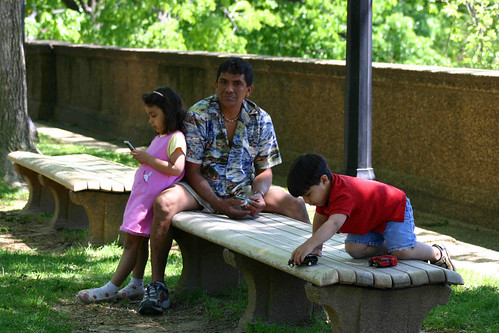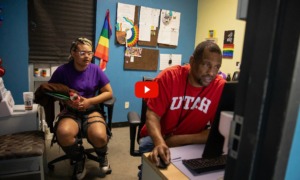 This week, the advocacy group First Focus garnered the support of 180 groups to support an amendment to the U.S. Senate’s recent immigration proposal that would extend the proposal’s expedited path to citizenship provisions to all immigrant children.
This week, the advocacy group First Focus garnered the support of 180 groups to support an amendment to the U.S. Senate’s recent immigration proposal that would extend the proposal’s expedited path to citizenship provisions to all immigrant children.
The amendment, called the “little dreamers” amendment, upholds the DREAM Act’s intent to include all children, said Wendy Cervantes, vice president of Immigration and Child Rights Policy at First Focus.
The bi-partisan Senate “Gang of 8” introduced the immigration reform bill, called the Border Security, Economic Opportunity Immigration Modernization Act of 2013 (S.744), in mid-April. It is a big step towards comprehensive immigration reform that is “long overdue,” said Jessica Jones, Equal Justice Works Fellow at the Women’s Refugee Commission, Migrant Rights and Justice Program.
Children of immigrants comprise 25 percent of the entire U.S. child population, said Cervantes “We need [a bill] to address their needs and their status … and make sure they are a part of our communities and not living in the shadows,” said WRC’s Jones.
Not all, however, are in favor of the proposal’s reforms. On Thursday, before the Senate Judiciary Committee, U.S. Sen. Jeff Sessions (R-Ala.), said “too little concern was expressed [in this proposal] for the impact this huge increase in immigration would have on struggling American workers and families. With job growth sluggish, unemployment still high, and millions of American families continuing to struggle, he said, Congress’ focus should be on getting jobs for lawful immigrants and Americans.
Path to citizenship
The Senate proposal includes amendments to the DREAM Act, expediting a young person’s ability to attain citizenship, said Cervantes. Under current conditions, most children and adults wait as long as 13 years to become legal citizens, she said. The Senate proposal creates an expedited five-year path for youth who have been in registered provisional immigration status (RPI) for five years, who entered the United States before age 16 and who graduate from high school or earn a GED within five years, according to a First Focus analysis of the proposal. The “little dreamers” amendment would extend the benefits of this expedited process to children of all ages.
System-involved and unaccompanied children
The Senate proposal also promotes reunification of children with detained or deported parents, said Cervantes. Alternatively, it ensures relatives have an opportunity to care for children in lieu of child welfare system involvement, makes sure parents who have been deported or are in immigration detention centers can participate in child welfare cases and affords parents due process rights in immigration and child welfare proceedings, said Jones. The bill also prevents immigration status alone from being a determining factor in termination of parental rights or child placement proceedings, she said.
The Senate proposal also includes important protections for vulnerable youth–unaccompanied minors, who enter the nation alone, said Jones. With the bill’s passage, these young people will now be provided legal representation at the government’s expense, said Cervantes.
Many law enforcement officials, however, have raised concerns about provisions in the bill that make it easier for unaccompanied youth to come into and remain in this country. Today, more than 30 current and former law enforcement and border patrol officials sent a letter to every member of Congress urging them to commit to stronger border enforcement. There will be an increase of runaway and unaccompanied youth who will begin to illegally enter this country, they explained, and many may face victimization or great bodily harm in the process.
Access to benefits
Even if the proposal is enacted, said Cervantes, significant barriers will remain for immigrant children to access some federal benefits, like the Children’s Health Insurance Program (CHIP), the Supplemental Nutrition Assistance Program (SNAP), Temporary Assistance for Needy Families (TANF) and Supplemental Security Income (SSI). When a youth is in the five-year transitional RPI period, he or she will not have access to any of these public benefits, she said. And even when the youth becomes a legal permanent resident, for some safety net programs, he or she may have to wait an additional five years to be eligible. In his statement today, however, Sen. Jeff Sessions said that even offering some benefits in five years was the wrong course. These costs, he said, would total into the trillions of dollars in the long term.
Tips for service providers
Both Cervantes and Jones said that youth service professionals can be a powerful voice in the immigration reform process by telling their congressional representatives about real challenges and successes immigrant children have experienced. Cervantes also urged youth service professionals to:
-
Provide immigrant families with as much information as possible about how to attain legal residency;
-
Explain to youth and their parents the rules regarding federal public benefits eligibility and help walk them through that process; and
-
Urge parents to make preparations in advance, if detention or deportation is a possibility by getting passports, medical and school records or setting up guardianships if they expect their children to remain behind.
Cervantes and Jones are also hopeful that the Senate proposal will pass. “This is the first time we are seeing a bill that appropriately addresses the needs of women, children and families,” said Jones. Past iterations have not taken a critical look at how their provisions would impact children and families — this version, she said, “moves in the right direction.”
Tuesday was the Senate Judiciary Committee’s filing deadline for amendments, explained Jones. The mark-up period starts Thursday and will continue through May after which, Jones is hopeful that the bill will make it to the Senate floor for a vote. “We think there’s a good chance the Senate will pass it,” said Jones.
Senator Sessions disagreed, indicating a struggle in the Senate. Congress should go back to the “drawing board,” he said, and develop reforms that “work for the American people.” Both, however, did agree that the House will be a much bigger battle to fight.
Jessica R. Kendall, JD is co-founder of Child & Family Policy Associates, a Maryland-based consulting firm, and has authored several books, articles and practice guides on child protection and juvenile justice issues.
Photo by Elvert Barnes | Flickr.com
























